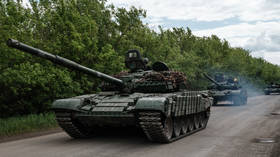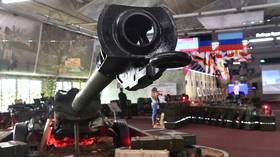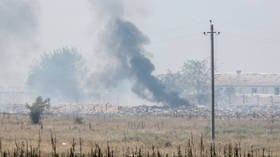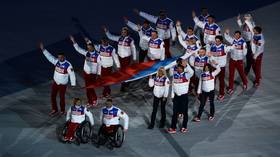US could become directly involved in Ukraine fighting – expert

American political scientist John Mearsheimer has issued a stark warning to the West, claiming the risks of a “catastrophic escalation” in Ukraine have been underappreciated, and suggesting the US may become directly involved in the fighting.
In a piece for Foreign Affairs published this week, the international relations scholar wrote that both the US and Russia are now “deeply committed to winning the war” – potentially by whatever means necessary.
While few would predict that the US could become directly involved in the fighting, Mearsheimer argues that it might, “if it is desperate to win or to prevent Ukraine from losing.”
On the other hand, he cautions that Russia may use nuclear weapons if it “faces imminent defeat” – a situation which could easily unfold if US forces were in fact drawn directly into the fighting.
The risk of such a catastrophic escalation is therefore “substantially greater than the conventional wisdom holds,” the political scientist believes.
Russia’s official stance on the use of nuclear weapons is that they may be used only in self-defense or when its existence is under threat. A spokesperson for Russia’s Foreign Ministry, Ivan Nechaev, reiterated that position this week, saying Moscow would deploy nukes “only in response to an attack as a self-defense measure and in extreme circumstances.”
Mearsheimer has argued for years that NATO’s eastward expansion would provoke Russia into a conflict that would leave Ukraine “wrecked.” His frequent warnings even landed him on a Ukrainian government ‘blacklist’ published in July. The list includes the names of politicians, pundits and intellectuals whom Kiev accuses of promoting “narratives consonant with Russian propaganda.”
For the US, the analyst believes, the conflict in Ukraine represents an opportunity to “knock Russia out of the ranks of great powers” and has tied its own reputation to the outcome.
Mearsheimer claims that Russia’s “ambitions” have also expanded since it began its military offensive in February. Until the eve of the military campaign, President Vladimir Putin was committed to implementing the Minsk II agreement, which would have seen the Donbass region remain part of Ukraine’s territory. Now, the analyst insists, with Russia having taken control over large swaths of territory in eastern and southern Ukraine, it is unlikely to return all “or even most of it.”
Given the deep level of involvement of the US through its provision of weapons and political support, Washington is “just a short step away from having its own soldiers pulling triggers and its own pilots pressing buttons” in Ukraine.
Mearsheimer lays out various potential scenarios in which the US could become more actively involved in the war.
As the conflict drags on, US policymakers are likely to consider taking “riskier steps” such as imposing a no-fly zone over Ukraine or inserting “small contingents of US ground forces.”
Another scenario would come about if Ukraine’s army was about to collapse and Russia seemed set to win a decisive victory. US officials could convince themselves that limited use of force would be possible without prompting Putin to use nuclear weapons. With US forces on the ground, Russia would see its survival at risk, providing a powerful incentive to use nukes. “At a minimum, they would consider demonstration strikes intended to convince the West to back off,” he argued.
A military mistake could also trigger an escalation if, for instance, a US and Russian fighter jet were to collide over the Baltic Sea. Such a situation could escalate quickly due to fear, lack of communication and mutual demonization, he wrote. Russian strikes on Poland or Romania in an effort to stop the flow of Western weapons also can’t be discounted, Mearsheimer claims.
“The Biden administration should have worked with Russia to settle the Ukraine crisis before war broke out in February. It is too late now to strike a deal,” the analyst said, adding that Russia, the West and Ukraine are now “stuck in a terrible situation with no obvious way out.”














